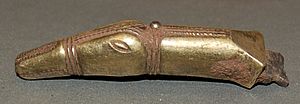George Speake facts for kids
Quick facts for kids
George Speake
FSA
|
|
|---|---|
| Born | 1944 or 1945 |
| Died | (aged 81) |
| Education | Slade School of Fine Art |
| Alma mater | University of Oxford |
| Known for | Leading authority on Anglo-Saxon animal art |
| Scientific career | |
| Fields | Art history and archaeology |
| Institutions | Institute of Archaeology at Oxford |
| Thesis | The beginnings and developments of Salin's style II in England (1974) |
| Doctoral advisor | Sonia Chadwick Hawkes |
| Other academic advisors |
|
George Speake was an English art historian and archaeologist. He was born in 1944 or 1945 and passed away on January 15, 2026. Mr. Speake was a respected expert on Anglo-Saxon animal art. He worked as an Honorary Research Fellow at the Institute of Archaeology at Oxford University. He also helped with the conservation of the famous Staffordshire Hoard and worked on rebuilding the Staffordshire helmet.
Early Life and Education
George Speake went to the Slade School of Fine Art in the 1960s. Later, in the 1970s, he studied at Oxford University. He attended St John's College and the Institute of Archaeology there.
At Oxford, he learned from famous archaeologists Christopher and Sonia Hawkes. In 1974, he earned his Ph.D. His research focused on Anglo-Saxon animal art.
Career and Discoveries

Mr. Speake was an expert in Anglo-Saxon art and its symbols. He spent time working on the amazing Staffordshire helmet. This helmet was found as more than 1,000 pieces and needed careful reconstruction. He also worked on the important Prittlewell burial site.
In 2014, he co-wrote a book about the Staffordshire Hoard. The book was called Beasts, Birds and Gods: Interpreting the Staffordshire Hoard. In it, he described a unique "eyeless, open-jawed serpent" on the helmet's cheek guard. A detailed paper about the helmet was published in 2018. He was also an Honorary Research Fellow at the Institute of Archaeology at Oxford.
One of Speake's most important works was his 1980 book, Anglo-Saxon Animal Art and its Germanic Background. This book was based on his Ph.D. research. It was a big step forward in understanding Anglo-Saxon art styles. The book looked closely at "style II" art. This was a type of animal decoration used in Northern Europe from the mid-6th century to the late 7th century AD.
Before Speake's work, "style II" was not well understood. It was often found on items belonging to important people. Famous examples include objects from the Sutton Hoo ship-burial and the Vendel boat graves. Speake's book covered every known example of this style up to 1974. He also showed that this art style came to England from countries like Denmark, Norway, and Sweden.
Personal Life
George Speake's partner was Birgitte. She was the head of conservation at the Pitt Rivers Museum. They had children, including Maria Speake. George Speake passed away on January 15, 2026, at the age of 81.
Important Books and Papers
- Speake, George. Anglo-Saxon Animal Art and its Germanic Background. Oxford University Press, 1980.
- Speake, George and Webster, Leslie. Beasts, Birds and Gods: Interpreting the Staffordshire Hoard. The British Museum Press, 2014.
- Speake, George. Aspects of the Staffordshire Hoard Helmet. (Published in 2018).
 | William L. Dawson |
 | W. E. B. Du Bois |
 | Harry Belafonte |

